Blog
What are hotels doing to restore travel confidence, win customers back?
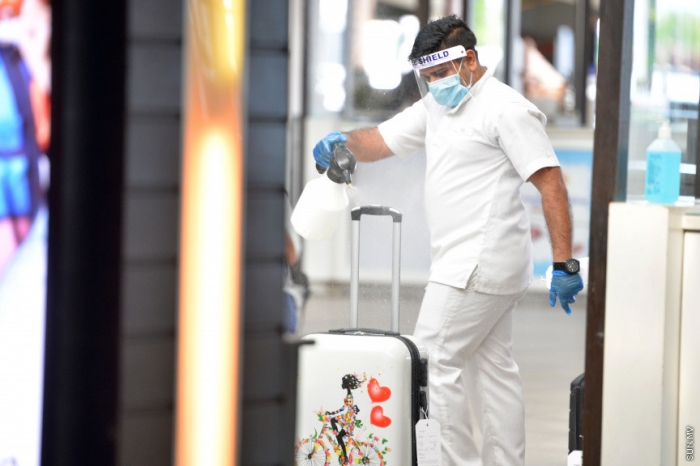
By Dolores Semeraro
The Indian Ocean’s most coveted tropical islands are reopening their borders to international tourists as we speak, but how much travel confidence has actually been restored across the consumers?
The Maldives has reopened its borders in July with no Covid-19 tests required prior to the arrival, while Seychelles is set to open on August 1 to low-risk arrival countries — both of them are not imposing quarantine to tourists upon arrival. Sri Lanka, previously set to reopen its borders next week, has now delayed to mid-August. Travellers heading to Sri Lanka would need to present a negative Covid-19 test taken no more than 72 hours prior to travel. Mauritius’ borders remain closed, with a tentative opening date set for September 1 with mandatory quarantine.
With all this in mind, how is a traveler supposed to rebuild his or her travel confidence while searching online for their next holiday? Are hotels and resorts providing the right information in the right format? Let’s take a closer look.
Apart from publishing a comprehensive update on global mobility, TripAdvisor has implemented a range of Covid-19 information on the hotel page, including checklists, personalised letters from the hotel manager and opening offers. An ongoing analysis across the industry shows that many of the resorts included in the study have copy-pasted the computer-generated ‘message from the manager’ that would supposedly make you feel safe and welcomed. The same message! Copy pasted! Would that sound reassuring to you?
Facebook and its realm of social media channels, have long provided Covid-19 related add-ons when you post an update; yet, the results of the study are showing that hardly any resort is actually using it when posting, let’s say, their reopening date to their followers. Wouldn’t that be the perfect Covid-19 update?

Now, let’s leave the web profiles aside for a moment and concentrate on the type of content the audience looks for and needs to restore its travel confidence.
Video content
At this stage, every resort wants you to download their multi-page PDFs, the health and safety guidelines implemented at the property from the moment you arrive until you bid farewell.
SAii Lagoon Maldives, however, embraced the video trend by showing, with a simple short-movie, how it all looks like from a customer’s perspective.
How much more powerful are a few seconds video versus pages of FAQ in PDF format? The answer is yours to give.
Mirror-content is a no-go
If video content is king, Instagram and Facebook stories are now the most used apps on social media followed by IGTV and LIVE Content. If I were to search for what’s happening in real-time at the resort I am planning to book, I would head straight to these two.
Recent results have shown that during the closure, hardly any resort has published video or live content, preferring instead a mirror content strategy whereas the same post is replicated across different social media channels. But how relevant is an Instagram-fit picture on your hotel’s LinkedIn page?
Most importantly, as island countries are reopening their borders and airlines are flying again, the type of message we are putting out today needs to rebuild travel confidence, so that our audience could feel safe again.
According to PWC’s latest ‘consumer sentiment survey’, travellers are willing to pay more to have more space, securing social distancing when on holidays. Some resorts are even operating at a reduced capacity to guarantee more space among their guests. But is having ‘a buffer’ going to make a difference?
Here are three creative ways to share informative content that helps to restore travel confidence:
- A mini-video walk-thru by the General Manager showing the new basics of hygiene standards and social distancing instead of a downloadable PDF;
- Short Live session on Facebook or Instagram to show the changes in each area of the resort instead of a checklist;
- An overview of ‘the journey’ from the airport to the resort instead of a link to the government website.
All of the above, then, shall be visible on your website.
By now, we all know that videos convert more than written posts, especially on social media. A faster and more effective strategy that aims to rebuild the special relationship you have with your audience must embrace video marketing, enabling you to reach them straight at the core of what they need the most: restore their travel confidence.
Note: Dolores Semeraro is a multilingual professional speaker and trainer, fluent in the Chinese language. She provides strategic direction and training courses to companies and tourism institutions helping them to speak today’s digital language of their audience. Her vision is to create a sustainable digital connection between travel industry stakeholders and their desired customers.
Blog
How to diversify Maldives’ tourism-heavy economy
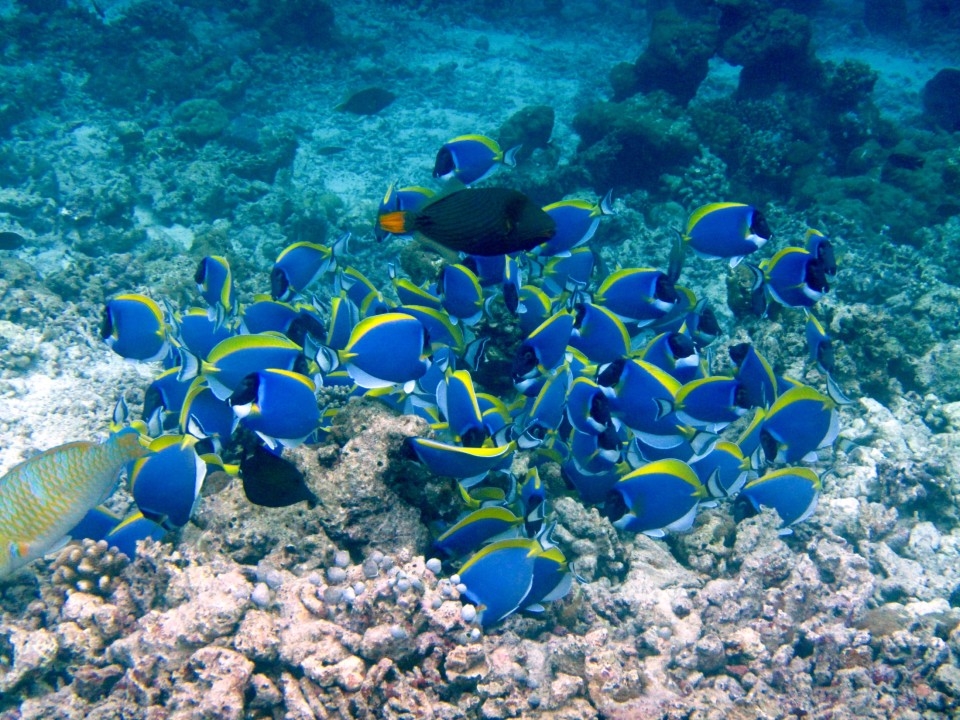
By Sonu Shivdasani
At Soneva, we adhere to the principle that local is best. Whether it’s food produced by our organic vegetable gardens or the fish we source from neighbourhood fishermen, local produce is always fresher, better tasting, and more sustainable.
Producing things within the country, rather than importing everything from abroad, also makes economic sense. And the greater variety of products and services you produce in-house, the easier it is to diversify the economy, making it more resilient.
In an Op-ed that I wrote last year, I mentioned that, “The Maldives is one of the world’s best places to operate a resort. And yet, the cost of borrowing the money to build one is eye-wateringly high. How do we explain this paradox?”
During a recent conversation with a Male-based banker, I was told why lending rates in the Maldives are so high: there is a perception of risk among the financial community because the Maldivian economy is so dependent on tourism.
As Maldivian President Ibrahim Solih, said during his National Day speech on November 11, 2020: “Covid-19 has made us realise our economy cannot solely depend on tourism. This is something we have always debated, yet failed to adequately address.”
It’s easy to understand why the Maldives wants to put some of its eggs in baskets other than tourism. Covid-19 has swung a wrecking ball at Maldivian tourism, which in turn has devastated the government’s finances, foreign currency reserves, and the value of the Ruffiya, which are all dependent on tourist dollars.
Though tourism is recovering since the border reopened in July, and many resorts (including Soneva Fushi and Soneva Jani) are currently as busy as they were last year, a few good months at the end of the year won’t make up for the carnage of March-July. And so, how to diversify the Maldives — a country that’s 99 per cent ocean, and with a small population?
Extracting better value from Maldives’ fish catch
An obvious place to start is in areas the Maldives already does well: fishing. Although the Maldivian fishing industry is already large, much of the value of the fish is in the processing, not the catching.
Here, the Maldives could improve. Instead of selling frozen, whole tuna to Thailand, more money would be made if all Maldivian fish were canned in the Maldives. The fisheries ministry recently said as much; announcing plans to expand cold fish storage.
The branding of Maldivian tuna could also be enhanced. The Maldives operates the world’s most sustainable fishing fleet. Every fish is caught by hand, with a pole and line, one-by-one. Nets and long-lines are banned, meaning there is almost no by-catch of sharks, turtles, dolphins and other charismatic or endangered sea creatures.
More could be made of this inherent strength, especially as consumers in Western export markets demand more sustainable food. Maldivian tourism is globally renowned for being the world’s most luxurious. Maldivian fish should be equally known as the world’s most environmentally friendly.
Growing our own food
Although the Maldives is 99 per cent sea, let us not forget about what can be done on that 1 percent of land. It’s heartening to see a big government push towards growing more food. There is huge demand, especially from resorts, for locally-grown, fresh produce.
Both Soneva Fushi and Soneva Jani have highly productive fruit, vegetable and herb gardens that supply the bulk of the ingredients for our restaurants. What we don’t produce ourselves, we strive to buy locally to maintain freshness and reduce carbon emissions. Over the summer Soneva also released a series of video tutorials based on our experiences, showing ways to farm in the Maldives, either on a commercial scale or in a window box.
Looking beyond farming and fishing, another opportunity the Maldives could explore further is its relationship with India.
The $1.4 billion assistance granted by India in 2018, and the more recent economic aid package, have both been of great help. But, rather than aid, the Maldives should engage with India to see how it can grow its economy both through tourism and non-tourism means to develop closer ties with this populous and economically significant neighbour.
Potential offshore financial hub
For example, the Maldives could enter into a double tax treaty with India. The Maldives could also negotiate with India, to allow Indian citizens to make personal investments in the Maldives and be able to remit more than $250,000 — the current Reserve Bank of India limit on any foreign currency remittance by an Indian in a particular year. In addition to this, perhaps more Indians could be allowed to pay for personal investments in the Maldives with Rupees. These Rupees could then be used by the Maldives to buy Indian goods.
With a double tax treaty with India in place, the Maldives could explore the opportunity to become a financial centre. Could the Maldives become India’s offshore financial centre, playing a similar role that Hong Kong does to China?
There is a closer Indian Ocean example; in 1989, Mauritius’ government decided that its economy was too dependent on tourism and sugarcane, so it chose to make the country an offshore financial centre.
Mauritius initiated double tax treaties with 18 African countries and India. Like the Maldives, Mauritius’s tax rate was considerably lower than the 18 African neighbours and India. As a result, foreign investors who wanted to invest in India or these 18 African countries set up companies in Mauritius, helping them to legally reduce their tax bills. There are now 20,000 offshore Mauritius companies.
On average, the basic statutory fees that the Mauritius government charges, such as directors fees, and stamp duties for operating companies, come to $5,000 per year. For all the offshore companies registered in the country, these fees tally up to $100 million per year — a huge source of revenue for the government.
Moreover, according to a recent report, Mauritius-incorporated offshore companies have $630 billion of assets. This is 50 times Mauritius’ GDP. If we assume that these companies achieve a 10 per cent return on capital, that means they have net profits of around $63 billion. It is likely that the Mauritius government received more than one per cent of these profits as taxes. Even at one per cent, this is the equivalent of $630 million of revenue to the government.
It has taken Mauritius 30 years to get to where it is. If the Maldives starts today, potentially in 30 years’ time, the government could generate more revenue from offshore finance than from tourism. There are many considerations when setting up an offshore centre. We have recently seen a global backlash against tax havens, so this will require a lot of thought and consideration. But, it is an opportunity.
Second-home schemes and outsourcing
Introducing second home schemes for foreigners is another way to diversify the economy. The government recently changed the law to allow foreigners to become resident in the Maldives if they invest $250,000 dollars, and deposit another quarter of a million in a local bank’s fixed deposit account for at least five years. Similar programmes, in countries such as Malaysia, are very popular. They make it easier for the government to sell debt and help ease dollar shortages.
Lastly, the Maldives could also look to offshore business process outsourcing, which has made cities such as Bangalore wealthy. These days, a British or American customer ringing into a bank call centre is as likely to speak with someone sitting in Bangalore or Hyderabad as Birmingham or Houston. While the Maldives does not have the huge pool of labour that India does, young Maldivians speak English well, so offshore processing could be done, albeit at a smaller scale.
The Maldives has paid a heavy price this year for its over-dependence on tourism. Nobody predicted Covid-19, or the impact it has had on the economy. But, as any good investor will tell you, the best way to mitigate risk is through diversification.
Editor’s Note: This op-ed was originally published on Linkedin by Sonu Shivdasani. Sonu is the founder and CEO of Soneva, which owns luxury resorts Soneva Fushi and Soneva Jani in the Maldives, and Soneva Kiri in Thailand.
Blog
A day in the life of Amilla Maldives’ HR Special Projects Manager
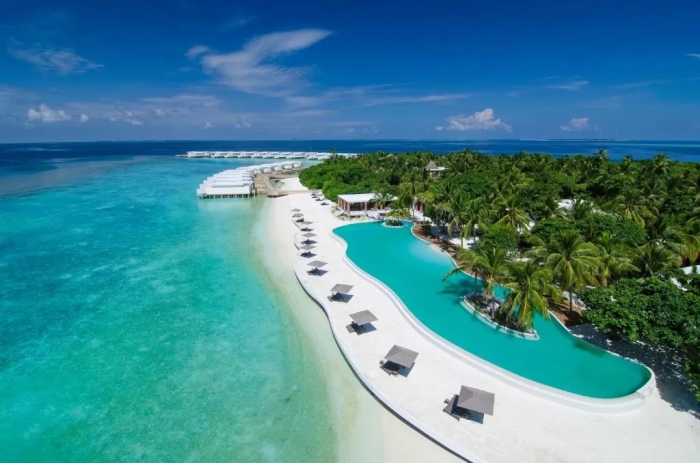
Hussain is a well-known face at Amilla Maldives as the resort’s energetic Assistant Manager of Recreation. With lower demand due to the pandemic this year, Hussain pivoted to a three-month secondment in HR Special Projects.
These unique projects are aimed at maximising the quality of life for everyone working at Amilla. They range from renovating the Islanders’ accommodation block to transforming the staff bar into a chilled-out café-style community space.
This dynamic and multi-talented Islander has also helped plan and run staff events — creating some dazzling decorations in the process. He has even channelled his inner artist to create paintings to brighten up staff areas.
Hussain originally hails from Kurendhoo, a small island in Lhaviyani Atoll. We caught up with him to find out more about how he’s ringing in the changes behind the scenes at Amilla.

How does a typical day begin for you?
With my current role, I don’t so much follow time as follow projects and people. So, I normally wake up around 6am, read the news from the Maldives and around the world for half an hour, do 15 minutes of stretching and warming up for the day, take a shower and then I’m ready to start my day.
Often, when I start something, I’ll have to finish it, otherwise I just cannot sleep! So, sometimes, if I had a late night, I’ll wake up at around 7am but never later than 7.30am, so I can get things done.
Every day can be different depending on my tasks, but one of my favourite things to do is making decorations for staff events. Everybody says I’m really good at it. I also like doing carpentry and painting abstract stuff. The management has given me a lot of opportunities to try out new ideas and the freedom to learn new things, which I really appreciate.
How closely do you work with the other Islanders on your projects?
The best resource of any company is their staff. If we don’t care for them, they won’t enjoy their jobs or their life with us. So, our first priority is always our staff and our guests.
Getting feedback every day is the biggest thing in HR Special Projects. Before we make any new service or changes, we get feedback from the staff. That’s because we need to give them what they want where this is possible. Normally, lunchtime is the best time to go speak to them. The best way I’ve found to do it is to have a friendly chat. I just go to wherever they are, have a coffee with them, then ask them in a friendly way. Otherwise, if I just ask them formally, they might not open up.
What has been your favourite special project to work on so far?
I thought something I really had to do was provide what the Islanders really need, so I started working with the Bliss tuck shop, because it’s difficult to get what they need from other islands, especially with the Covid-19 restrictions. So, I’ve changed the concept and created more options as well as redesigned the shop. Red Bull is the most popular item, of course! It’s their basic need, they enjoy it a lot. But although we have a canteen, we didn’t have anything like a café area for them to enjoy the drinks they bought from the shop.
What was the solution?
We have a nice bar which needs a little attention to evolve the concept into something new because as Maldivians, with our culture, we’re not allowed to drink alcohol. So, if we have a bar where people think it only serves alcohol, it means some of the staff can be there, but some might not feel comfortable. I’m leading on the project to transform the bar into an area where the Maldivian staff and expat staff can enjoy things together as one family. This new concept will be more than a bar, it’ll be more like a café area where staff can also do things like book a cinema night, or celebrate a private birthday party with their friends, and so on.
How did you end up in this special projects secondment?
I went back to my island when the Covid-19 pandemic hit but they called me to ask if I was interested in this role. Before this I was working in recreation. I love being active and working with guests and wanted to be back at Amilla with this new opportunity to help me grow and have new experiences.
Can you tell us about your journey to working in recreation?
When I was a teenager, I loved sports and I wanted to play sports professionally, but unfortunately there weren’t many opportunities in the Maldives at the time, so I decided it wasn’t a good idea. Then I decided that recreation at a resort would be a good job because then you get to do everything. But it was hard to get into, so I actually started working in childcare at another resort.
I love kids and it was fun. I spent four years there and became Kids Club Manager, but I still wanted to get into recreation. So, I took a step down to become a Recreation Supervisor at another resort and then finally became Recreation Manager. It was hard to take a step backwards, but it was worth it .
Then I got a knee injury and couldn’t do sports anymore. I had to slow down and from there I decided to learn more about creative art and tennis too. Then this year I got offered the chance to join the HR team, taking care of special projects and staff communications.
I learned one thing from my past; I didn’t follow my passion when I was a teenager to become a professional sports player because of the restrictions including my injury. But I ended up learning many other things that I can use to create beautiful things or to make magic, as our HR Director says! And now with the knowledge and experience I have, I just want to help other people to be happy and follow their passions.
For more information about the resort and bookings, please email sales@amilla.mv or visit www.amilla.com
Action
Sustainable development of coral reefs at Cinnamon Dhonveli Maldives

Renowned for its iconic stunning over-water suites, Cinnamon Dhonveli Maldives is a beautiful tropical island resort offering exclusive access to the classic Pasta Point surf break, described as the “wave-machine” of the North Malé Atoll due to its consistent four to six foot waves.
Green Globe recently recertified Cinnamon Dhonveli Maldives.
The resort first started their coral restoration project in 2018 to help replenish diminishing coral reefs and have continued to develop this initiative since then.
“Coral reefs represent some of the world’s most spectacular beauty spots. They are also the foundation of marine life, without them many of the sea’s most exquisite species will not survive,” Sanjeeva Perera, General Manager at the resort, explained.
“The awareness and in-depth knowledge we receive from Green Globe during the recertification process continues to guide us on the correct path to take in the bold steps forward toward the sustainable development of coral reefs that will benefit future generations in the Maldives.”
Coral reefs in oceans all around the world are dying. It is estimated that nearly one sixth of these reefs will be dead within the next twenty years.
In keeping with the commitment of Green Globe members to manage and operate businesses to the highest level of sustainability, the Cinnamon Dhonveli team initiated this mariculture project two years ago focusing on the pre-emptive restoration and rejuvenation of reefs affected by coral bleaching.
The project uses ‘reef balls’ as artificial reef structures implanted with Mari corals that are cultivated in special nurseries. The reef balls are then transplanted onto the bare substrate to grow.
With marine conservation at the heart of their sustainability vision, the Cinnamon Dhonveli team is committed to making their artificial coral reef propagation project a great success in the Maldives.
They also aim to set up a Marine Discovery Centre to educate visiting youth and children in coral reef propagation, environmental awareness, and the rearing and rescue of sea turtles.
Located no more than a 25-minute speedboat ride from the main Velana International Airport, Dhonveli’s proximity and diversity combine to make it one of the most popular destinations in the Maldives.
The island is constantly buzzing with action as divers, surfers and beach bums alike find a common ground in the world of excitement this little island has to offer. Magnificent waves and a policy of sustainable surfing combine to make Pasta Point at Cinnamon Dhonveli one of the most sought after surfing locations by award-winning surfers from around the world.
Large families, groups of friends, divers and snorkelling buffs all seem to find a comfortable common ground in the heady atmosphere of the 16-acre island as well. Sink your teeth into our succulent seafood and indulge in the theme nights at each of the three restaurants with the best of international cuisine. Unwind at the spa or sink into the comforts of the 148 plush rooms.
-
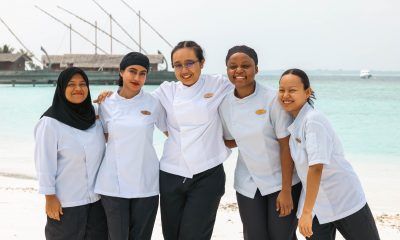
 Cooking1 week ago
Cooking1 week agoWomen at heart of kitchen: Milaidhoo Maldives marks International Women’s Day through gastronomy
-
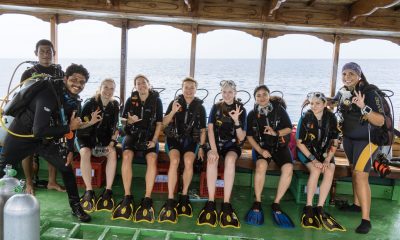
 Action1 week ago
Action1 week agoAtmosphere Foundation launches annual dive training scholarship for Maldivians
-
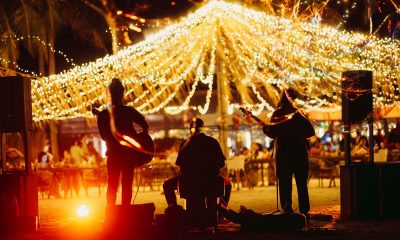
 Entertainment1 week ago
Entertainment1 week ago‘One festival, every sense’: Fari Islands Festival announces August 2026 return
-
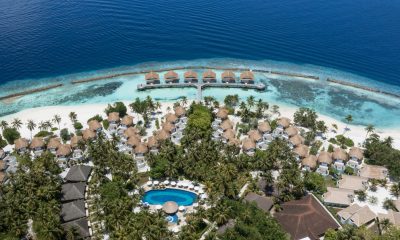
 Awards1 week ago
Awards1 week agoBandos Maldives earns Booking.com Traveller Review Award 2026
-
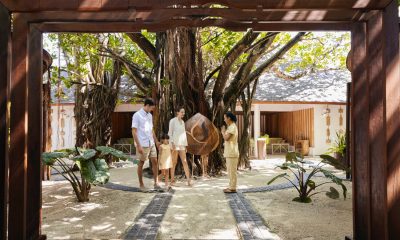
 Featured1 week ago
Featured1 week agoAncient banyan tree anchors spiritual experiences at Machchafushi Island Resort
-
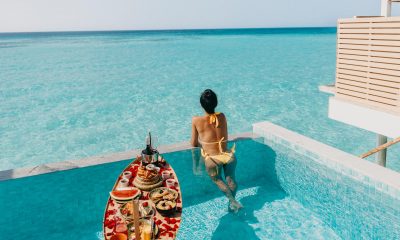
 News1 week ago
News1 week agoMeyyafushi Maldives opens with focus on design-led all-inclusive experiences
-
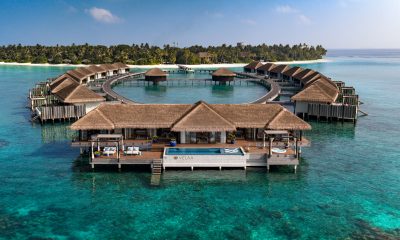
 News6 days ago
News6 days agoRefined overwater vision: Velaa Private Island’s upgraded Ocean Pool House
-
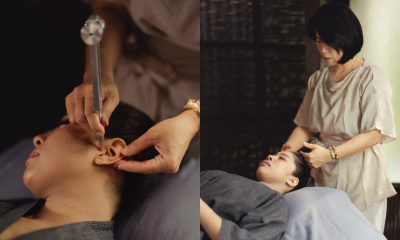
 Featured6 days ago
Featured6 days agoYoko Kawaguchi to lead holistic wellness residency at Vakkaru Maldives














